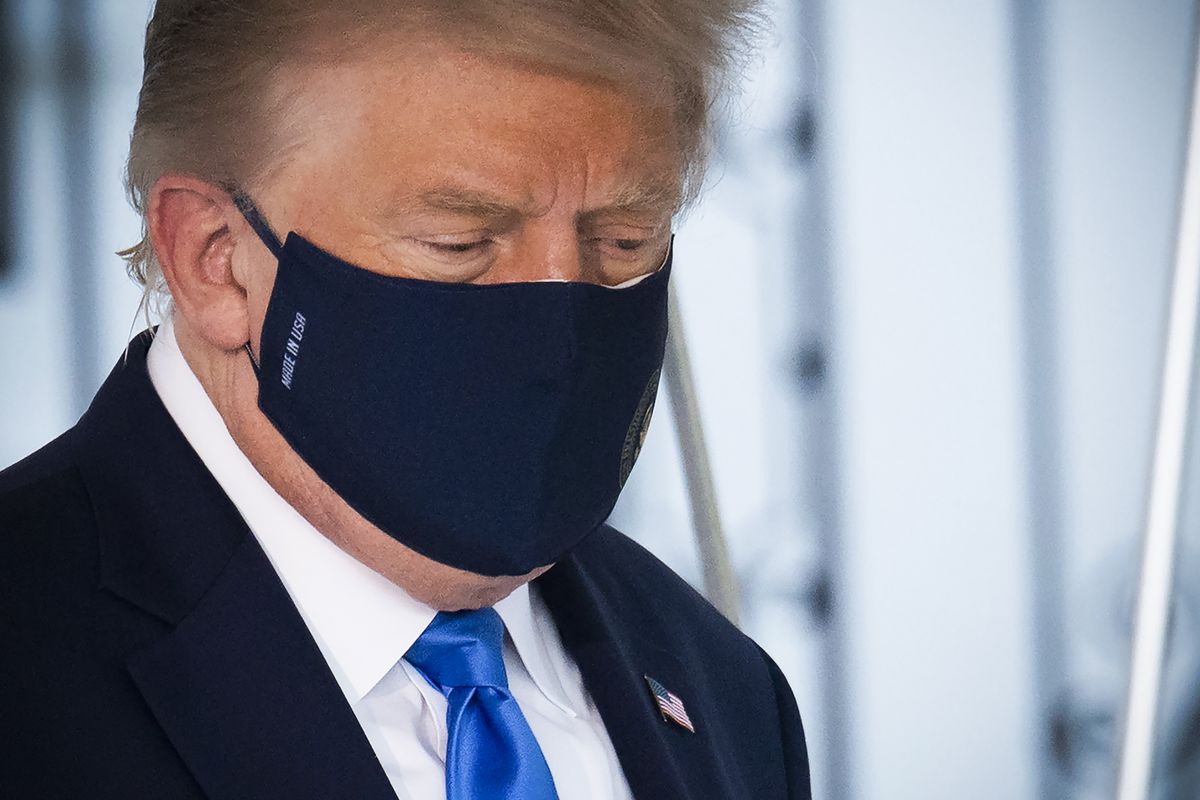Donald Trump has been given an experimental coronavirus antibody cocktail not available to the public and made from mice as part of his treatment for coronavirus.
The cocktail, developed by US drugmaker Regeneron, is also starting to be used in recovery trials in the UK and was described as ‘very positive and very potent’ by an Oxford professor this morning.
As well as the antibody-drug, REGN-COV2, the president has been taking other treatments including remdesivir, zinc, vitamin D, famotidine, melatonin and aspirin.
However, it is the cocktail that experts hope will be the key to his recovery, with Regeneron’s latest data from the ongoing trials showing the drug drove down the viral loads of patients who were not hospitalised, and cut their recovery times by nearly half.
It contains an antibody made by the company from mice, and another isolated from a recovered Covid-19 patient – each of which may help to neutralise coronavirus.
But it’s very much an experimental treatment, and the data announced earlier this week are the first published from the trial.
Two patients treated with the antibody cocktail had ‘adverse events’ – undesirable side effects. One of those was a ‘serious’ adverse event, but Regeneron did not reveal details of what happened to the patient, who received a low dose of the drug.
Dr Sean Conley, Trump’s physician, wrote in a White House memo yesterday: ‘Following PCR-confirmation of the President’s diagnosis, as a precautionary measure, he received a single 8 gram dose of Regneron’s polyclonal antibody cocktail.’
Peter Horby, professor of emerging diseases at Oxford University, told BBC Radio Four’s Today programme that the drug was safe and that just one treatment could provide protection for up to six weeks, before then potentially being topped up again.
He said: ‘It’s an artificial antibody, a cocktail of two antibodies, designed so it binds strongly to a protein on the surface of the virus.
‘That helps prevent the virus from attaching to cells, entering the cells and replicating, and it also helps our own immune system to attack and kill the virus.
‘This class of drugs have been around for quite a while now and they’re extensively used in inflammatory conditions and cancers and they’re pretty safe and well understood.
‘The technology is something we have confidence in. This particular drug has probably been given to four or five hundred mild or severe patients in different trials and so far there have been no worrying safety signals.
‘It’s very promising, it’s very potent. In the laboratory in cell cultures it has a very strong effect against the virus and there have been some studies in artificially infected animals where it also shows benefits, so of the drugs that are available it’s one of the most promising.
‘We have it in the recovery trial in the UK, we started that over the last weekend and it’s available in about three hospitals in the north. We’re hoping to roll it out next week to another 30 to 40 hospitals.
‘It’s anti-viral so it will work in patients in whom the virus is still replicating, so it could be used at any stage of the disease and for any age group.
‘There’s a phenomenon where the response to vaccines is poorer as you get older, whereas these class of drugs have a very long half-life, and you can have just one treatment which can provide protection for a month or longer, so in that sense they’re quite attractive for the older population.
‘One dose will give you prolonged protection if it works. It would do you for a month to six weeks because the antibodies have quite a long life in the body before they’re removed.
‘It won’t be as long as a vaccine but it would give you some protection for quite a period. It could be [topped up every six weeks].’








![I Didn’t Divert N10bn Abia Airport Funds, I Reallocated It For Greater Good – Ikpeazu [Video] I Didn't Divert N10bn Abia Airport Funds, I Reallocated It For Greater Good - Ikpeazu [Video]](https://abntv.com.ng/wp-content/uploads/2024/05/Okezie-Ikpeazu-100x75.jpg)
